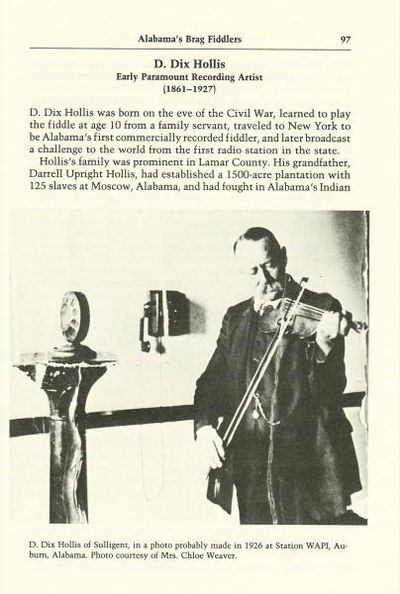Annotation:Walking in the Parlor (3): Difference between revisions
No edit summary |
No edit summary |
||
| Line 1: | Line 1: | ||
== | __NOABC__ | ||
<div class="noprint"> | |||
<p><font face="Century Gothic" size="4"> Back to [[{{BASEPAGENAME}}]] </font></p> | |||
</div> | |||
---- | ---- | ||
<p><font face=" | {{#lst:{{PAGENAME}}|abc}} | ||
---- | |||
<div style="page-break-before:always"></div> | |||
<p><font face="Century Gothic" size="2"> | |||
<div style="text-align: justify; direction: ltr; margin-bottom: 90px; margin-left: 70px; margin-right: 120px;"> | |||
<br> | <br> | ||
'''WALKING IN THE PARLOR [3].''' American, Reel. G Major. Standard tuning (fiddle). ABB'. Similar to "[[Walking in the Parlor (1)]]," albeit a ‘crooked’ (irregular meter) version. | |||
<br> | <br> | ||
</div> | |||
</font></p> | </font></p> | ||
<p><font face=" | <div class="noprint"> | ||
[[File:hollis.jpg| | <p><font face="Century Gothic" size="2"> '''Additional notes''' </font></p> | ||
<p><font face="Century Gothic" size="2"> | |||
<font color=red>''Source for notated version''</font>: - [[File:hollis.jpg|400px|thumb|left|A page from Joyce Cauthen's "With Fiddle and Well-Rosined Bow: Old Time Fiddling in Alabama" (1989)]] | |||
D. Dix Hollis (1861-1927, Alabama) [Phillips]. Hollis was descended from a family of West Alabama planters with large slave holdings. At the age of 10 Hollis learned to fiddle from a family servant and from older fiddlers around Sulligent, Alabama. While studying medicine in Baltimore for 5 months in 1884, he also took lessons from a classical violinist, and after completing his studies he returned to become the town physician of Sulligent. In 1924 he travelled to New York and recorded 12 tunes for Paramount Records. | |||
<br> | <br> | ||
<br> | <br> | ||
</font></p> | </font></p> | ||
<p><font face=" | <p><font face="Century Gothic" size="2"> | ||
''Printed sources'': Phillips ('''Traditional American Fiddle Tunes, vol. 1'''), 1994; p. 252. | <font color=red>''Printed sources''</font> : - Phillips ('''Traditional American Fiddle Tunes, vol. 1'''), 1994; p. 252. | ||
<br> | <br> | ||
<br> | <br> | ||
</font></p> | </font></p> | ||
<p><font face=" | <p><font face="Century Gothic" size="2"> | ||
''Recorded sources'': <font color=teal>Document DOCD 8032, D. Dix Hollis (et al) – “Alabama Stringbands.” Paramount 33153 (78 RPM), Dr. D. Dix Hollis (1924).</font> | <font color=red>''Recorded sources'': </font> <font color=teal> -Document DOCD 8032, D. Dix Hollis (et al) – “Alabama Stringbands.” Paramount 33153 (78 RPM), Dr. D. Dix Hollis (1924).</font> | ||
<br> | <br> | ||
<br> | <br> | ||
</font></p> | </font></p> | ||
<p><font face=" | <p><font face="Century Gothic" size="2"> | ||
See also listing at:<br> | See also listing at:<br> | ||
See Austin Rogers' transcription from D. Dix Hollis playing [http://drfiddle.com/show_tune.php?id=733] [http://drfiddle.com/pdf/DDH_Walking_in_the_Parlor_-_Melody.pdf]<br> | See Austin Rogers' transcription from D. Dix Hollis playing [http://drfiddle.com/show_tune.php?id=733] [http://drfiddle.com/pdf/DDH_Walking_in_the_Parlor_-_Melody.pdf]<br> | ||
</font></p | </font></p> | ||
<br> | <br> | ||
---- | ---- | ||
== | <p><font face="Century Gothic" size="4"> Back to [[{{BASEPAGENAME}}]] </font></p> | ||
</div> | |||
__NOEDITSECTION__ | |||
__NOTITLE__ | |||
Revision as of 14:06, 21 March 2019
X:73 T:Walking In The Parlor (Hollis) C:from D. Dix Hollis (1861-1927) S:via Mozaik Z:abc-transcription Josh Larios <hades@elsewhere.org>, 2014.11.18 S:Mozaik, Changing Trains N:Finish on a 4-repeat of the A section. N:NB: Chords here are a total mess. Ignore them. M:4/4 L:1/8 K:G DF |: "G"GABG DFGA | "C"BABG AGEF | "G" GABG DFGA |1 "D7"BGAF "G"G2 DF :| |2 "D7"BGAF "G"G2 D2 :|3 "D7"BGAF "G"GA Bc || "G"d4 g3a | bagb "C"ag- ga | "G"bedg eaga | "D7"bgab "G"g2 ga |"G"gedg "C"eaga | "G"babg "C"abga | "G"bedg "C"eaga | "D"bgab "G"g2 (b_b |"G"=b)aga ge"D"dg | "C"eg- ga gfgg | "Am"edBG "Bm7"AGEF | "C "GABG DFGA | "D"BGAF "G"G2 DF ||
WALKING IN THE PARLOR [3]. American, Reel. G Major. Standard tuning (fiddle). ABB'. Similar to "Walking in the Parlor (1)," albeit a ‘crooked’ (irregular meter) version.

